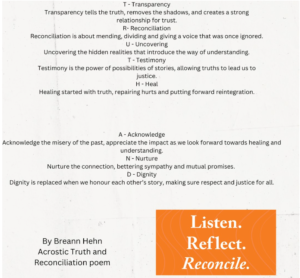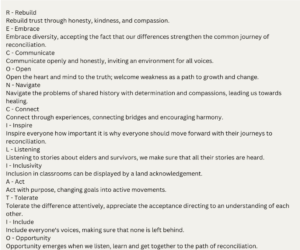As Simpson (2017) explains, “Reconciliation requires more than words, it demands action that challenges colonial power structures and honours Indigenous ways of being” (pg 24). This reminds me to inspire myself to move beyond the reflections and take significant steps toward decolonizing the way of thinking. By listening actively to stories from elders and survivors, I learned to value the strength of Indigenous communities and the importance of their voices. In my poem the line “Listening to stories about elders and survivors, we make sure that all their stories are heard.” looks at commitment to understanding and empathy.
My journey towards reconciliation is an ongoing process. ECS 101 has taught me that reconciliation needs honesty, open-mindfulness, and the willingness to confront the uncomfortable truths about the past, which is usually uncomfortable to confront. It’s more than just learning about the history, relationships, respect, and putting effort in towards a path of belonging. My aesthetic representation pictures the nature of this journey, reminding me that reconciliation is a process of truth, healing, and connection. By acknowledging the past, acting with intent, and accepting inclusivity, I hope to give to a society that honours their voices and challenges of Indigenous peoples. As the TRC reminds us, education is the key to addressing historical injustice and moving forward in reconciliation. This is the responsibility we all allow, and it is one in which I am committed to.

